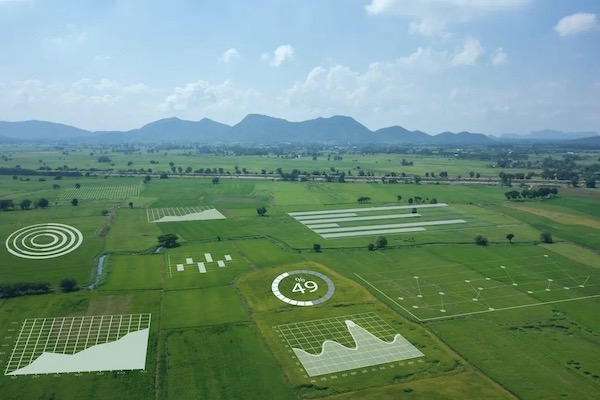Published on the 23/08/2023 | Written by Heather Wright

Sunny days ahead for sector…
More than US$1.8 billion in agtech deals was done in quarter two of 2023, and while the dollar value is down 8.7 percent on Q1, Pitchbook is forecasting sunnier skies ahead for the vertical, with a positive deal making outlook through the rest of the year.
The venture capital, equity and M&A database says it tracked 210 agtech deals in Q2 – an increase of 3.4 percent on Q1, albeit with slightly reduced deal values, indicating a potential plateau in deal activity.
There were notable cases of investors ploughing funds into agtech, though. Insect grower Ynsect garnered US$175 million in its series D round, while farm management platform AIS scored $117 million in a late stage VC round and agribusiness marketplace The Green Coffee Company banking US$100 million.
“Agritech innovations are a critical part of the solution.”
Australian agtech also got a look in, with Gold Coast indoor growers Stacked Farm’s US$21.4 million VC deal seeing it ranked among 10 key late stage VC deals. Tayside Investments Australia was the lead investor. Stacked Farm uses robots to plant, harvest, bag and box produce from vertical growing operations. It’s now harvested nearly $100 million from investors since beginning its first external capital raise in 2021.
Agritech New Zealand has forecast New Zealand’s agritech sector to grow at least fivefold by 2030, with more Kiwi companies expected to list on the ASX to raise capital and target global markets.
A 2022 New Zealand Agritech Insights Report from the Technology Investment Network (TIN) identified 131 agritech companies in New Zealand, of which 109 were in the ‘pipeline’ stage – defined as pre-revenue to NZ$3.5 million in revenue). The combined companies had revenue of $1.6 billion, with almost half coming through exports.
The Australian Agritech Association (AusAgritech) is due to release its report, sponsored by the Australian Trade and Investment Commission and Agriculture Victoria, into the Australian agritech market this month.
Tracey Martin, AusAgritech CEO, has previously said she believes Australia has at least 500 agritech firms.
Globally, climate change and food insecurity are helping increase VC interest in industries like agtech.
Brendan O’Connell, Agritech New Zealand CEO, says the world needs higher agricultural productivity amid population growth, while enabling climate action at the same time.
“Agritech innovations are a critical part of the solution to feed more people,” O’Connell says.
Pitchbook says aquaculture and farm management software companies rebounded strongly in the second quarter of 2023, with both scoring their second-strongest quarters in venture capital deal value on record.
In its Q2 Agtech Report the company notes a significant rise in the median pre-money valuation for agtechs, jumping 33 percent to US$17 million – the opposite of the decline expected on the back of market volatility.
Pitchbook says a combination of factors, including a slowdown in deal activity and an emphasis on quality are likely driving that increase.
“GPs [general partners, the managers of the funds] are now dedicating more time to due diligence and deal evaluation, resulting in longer closing times for deals. The ones that are being close prioritise existing portfolio companies or those with lower risk and higher quality.”
Among the key early stage VC deals noted by Pitchbook was the US$29.5 million series B funding pumped into Indian drone and imagery analytics company Pixxel, with Alphabet’s Google part of the funding.
The Bengaluru-based Pixxel, whose customers include Australian agritech company DataFarming and mining company Rio Tinto, is building a constellation of hyperspectral earth imaging satellites and the analytical tools to mine insights from that data.
The company says hyperspectral imaging has the potential to shift how precision agriculture is managed, claiming its image providing eight times more information and 50 times better resolution than existing in-market options. That allows for in-depth analysis, with the high spectral resolution able to be utilised for crop variety classification to enable farmers to customise management practices, monitor health and growth and optimise input usage, costs and yields.
In New Zealand, ‘AI sensory fusion platform’ Macso closed their second funding round, oversubscribed, in July. The company pulled in $2.4 million – $400,000 more than it had been seeking.
The two-year old business has commercialised an AI ‘ear’, which listens for respiratory illness in livestock. It has also built an AI ‘nose’ to detect vaping and cigarette fumes – no, not in case the pigs take up smoking, this one is targeted at schools. The ear has been deployed in the US, while the Canāree nose is in use in North America and Australia, with trials underway in New Zealand.
Meanwhile, Halter, with its GPS-enabled solar collars for cows, raised NZ$85 million in a series C round in March.
In a further push for the sector, Victoria’s startup agency, LaunchVic, and Agriculture Victoria has opened its $1 million Hugh Victor McKay Fund for early stage agtech startups. The fund will invest up to $200,000 into at least five startups in the next 12 months, co-investing with private sector investors who will match the government contribution by a minimum of 2:1.
Matthew Pryor, part of the Hugh Victor McKay Fund investment committee and founder of agtech and climate VC, Tenacious Ventures, says the fund will provide critical support for founders building the future of on-farm productivity and sustainability.
“Early-stage ventures in agtech are often working with hardware and deep tech. These can be essential innovations in agrifood transition, since you can’t eat software,” Pryor says.
“The early stages of growth can be more capital intensive for these startups, so additional leverage on early capital is very catalytic.”



























